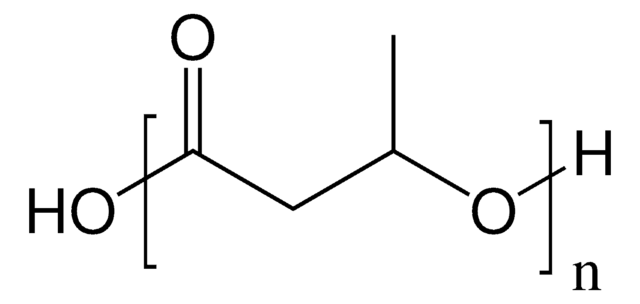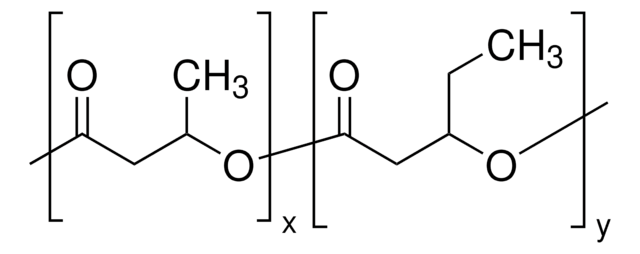916358
Poly(3-hydroxybutyric acid)
average Mn 10,000
Synonym(s):
P3HB, PHA, PHB, Polyhydroxybutyrate
Sign Into View Organizational & Contract Pricing
All Photos(1)
About This Item
Recommended Products
Looking for similar products? Visit Product Comparison Guide
Application
Poly(3-hydroxybutyric acid) (PHB) is a common polyhydroxyalkanoate (PHA), it has been widely used for food packaging, medical implants, biodegradable sutures and drug delivery systems due to its biocompatible and biodegradable properties. PHB has been investigated as drug delivery micro- and nano-carriers.
Storage Class
11 - Combustible Solids
wgk_germany
WGK 3
flash_point_f
Not applicable
flash_point_c
Not applicable
Certificates of Analysis (COA)
Search for Certificates of Analysis (COA) by entering the products Lot/Batch Number. Lot and Batch Numbers can be found on a product’s label following the words ‘Lot’ or ‘Batch’.
Already Own This Product?
Find documentation for the products that you have recently purchased in the Document Library.
Senthilkumar Pachiyappan et al.
IET nanobiotechnology, 13(4), 416-427 (2019-06-07)
In this study, polyhydroxybutyrate (PHB) nanoparticles were synthesised following nanoprecipitation method having different solvents and surfactant (Tween 80) concentrations. In this study, PHB nanoparticles were encapsulated with curcumin and subjected for sustained curcumin delivery. Both the curcumin loaded and unloaded
K Juni et al.
Critical reviews in therapeutic drug carrier systems, 3(3), 209-232 (1987-01-01)
Poly(hydroxy acids) so far have been examined for use in drug delivery in limited number, while the advantageous use of the polymers has been recognized due to their biodegradability and biocompatibility. Homo- and copolymers of lactic acid and glycolic acid
Sumeet Kapoor et al.
International journal of pharmaceutics, 511(2), 876-889 (2016-08-06)
Faster biodegradation, immunogenicity and lack of cell penetrative capabilities are hurdles in development of peptidyl drugs for cancer therapy. Polymeric carriers can be used to overcome these problems. The present study is focused on the use of polyhydroxybutyrate as a
Our team of scientists has experience in all areas of research including Life Science, Material Science, Chemical Synthesis, Chromatography, Analytical and many others.
Contact Technical Service![Poly[(R)-3-hydroxybutyric acid] natural origin](/deepweb/assets/sigmaaldrich/product/structures/129/476/7d1c924b-f644-4889-a2d6-d7a923ce382c/640/7d1c924b-f644-4889-a2d6-d7a923ce382c.png)








